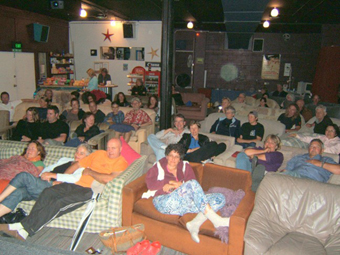Please show your support of Waihekepedia by adding a link to us from your web site. Waihekepedia T Shirts now available at the Ostend Market
Difference between revisions of "Earth Cinema"
| Line 10: | Line 10: | ||
| − | Entry is by donation ($10 suggested) or by koha, and proceeds go to a different community group every month. | + | Entry is by donation ($10 suggested) or by koha, and proceeds go to a different community group every month. Screenings are restricted to Cinema Circle members, and you can join at the door (annual sub of $2). |
| − | |||
| − | |||
| − | Screenings are restricted to Cinema Circle members, and you can join at the door (annual sub of $2). | ||
| − | |||
| − | |||
Revision as of 07:57, 15 October 2009
Waiheke Earth Cinema Circle (an offshoot of Spiritual Cinema Circle) is a group of people who get together for an offering of films from all over the world that explore the natural world — and fundraise for Island causes at the same time.
Earth Cinema evenings are held on the second Wednesday of every even month at Waiheke Community Cinema and are sponsored by Waiheke Wellness, Auckland City and the Cinema.
Entry is by donation ($10 suggested) or by koha, and proceeds go to a different community group every month. Screenings are restricted to Cinema Circle members, and you can join at the door (annual sub of $2).
December's films (on the 9th) are:
- 7:30: Losing the Elephants: Of the 3,000 to 4,000 Asian Elephants left in Thailand, nearly 80 percent are working in the tourism industry, which separates and trains baby elephants through beatings, and keeps these highly social animals isolated and sentenced to a life of hard labor. However, one brave woman, Lek Chailert, is changing those statistics, and has started the Elephant Nature Park to provide a sanctuary for the elephants. This poignant documentary provides a view of elephants like no visit to the zoo ever will — and demonstrates the power of one person to affect change. [25m]
- 7:55: Arch’s Iguanas: On Roatan Island off the coast of Honduras, Sherman Arch shares a 10-acre farm with over 3,500 iguanas. In the early 1980s, Arch saw the population of these reptiles decline due to hunting, poaching and poverty. He provides a habitat where they wander freely without predators, reproduce, and help educate humans. Today, his sanctuary is a popular tourist attraction that inspires visitors to take a special interest in iguanas — and the possibilities pioneering change can foster. [25m]
- 8:20 Affairs with Bears: Mammoth Lakes, CA, a rural town bordering bear country, must learn how to draw the line between humans and bears. What is admissible for bears and their constant search for food – and for humans encroaching into bear country? How can the town keep everyone safe? In this dramatic short, one man is willing to be the best kind of authority, one who understands both sides of the story. [27m]
- 8:50 Milking the Rhino: Nature documentaries typically ignore a key feature of the African landscape — the villagers just off-camera, who live with wildlife on a daily basis. Rural Africans are often depicted as the problem — they poach, encroach on habitat, and spoil our myth of wild Africa. This is the story of community-based conservation efforts and human-wildlife coexistence. The Maasai and Himba tribe are now becoming conservationists while vying for wildlife-tourism income. [83m]
Proceeds will go to the Hauraki Gulf Charitable Trust, which administers McKenzie Reserve, Goodwin Reserve, and Waiheke Wetlands Projects.
You can view the online programme here.
